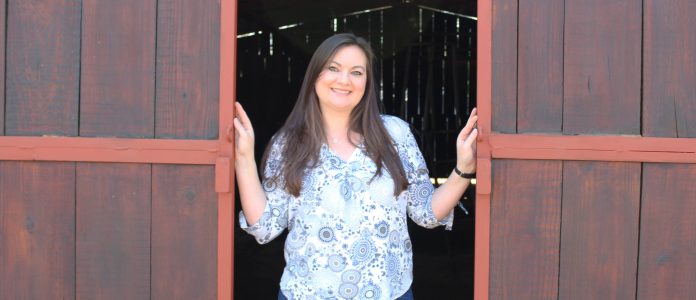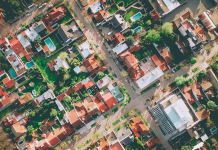You might not need those soggy teabags or carrot peels. But Carmen Jordaan does. Here’s why.
Making your own compost is one of those ideas that seems really great at the time. Like making your own body scrub or jam. The reality is rather different though, as anyone who has tried to stop their dog from drinking stinky compost water will tell you.
“That’s one of the reasons we started Whole Earth Organic Farm,” says Carmen Jordaan. “So many people want to make their own compost, but they just don’t know how to. We’ve taken away all hard work.”
It’s how Whole Earth Organic Farm makes compost that’s so remarkable, though – it does so by collecting the kitchen waste that most people don’t know what to do with. The company not only collects the waste from your home; it also provides the bin for you to stash your peelings and other leftovers in between collection days. Then … once they’ve done the magic, the ready-to-use compost is delivered back to you on the same day they next collect your waste.
“The problem is that food waste is one of the biggest producers of methane, one of the biggest contributors to global warming. Usually, it ends up as landfill – but there’s so much you can do with it.” Preventing soil erosion is a prime example. Yes, it’s hard to see how your old carrot peels and eggshells can put a stop to the formation of bare land, but Carmen explains that it’s all about returning nutrients to the soil. Get that right, and you set off a chain reaction – good soil means plants can grow, more plants attract bees and other insects, and before you know it, there’s a thriving ecosystem in place where once there was barren land.
Carmen’s idea for helping homeowners find a solution for kitchen waste is a natural extension of her experience in recycling. She explains that she has been part of the industry since graduating with an Honours degree in Environmental Management. “I was delighted when I found out, at a university open day, that this was actually a subject I could study!” she recalls.
Carmen’s wonder stemmed from the fact that the environment was tightly bound into most of her family’s activities. “My dad is one of the top birders in South Africa and, while my mom was also passionate about birdlife, plants were her real love. Before I was old enough to walk, they used to put me in a backpack so that I could accompany them on their hikes,” she says. Carmen’s mother was “obsessive’” about indigenous plants, and it wasn’t unusual for her to urge friends to remove an invasive species from their gardens or to rescue indigenous specimens from a building site.
Carmen says she is just as bold when it comes to taking action for the environment. So, when she was approached by a recycling company to help it boost customer numbers, she leapt at the opportunity. “I walked from house to house, urging them to sign up with us,” she says. It was gruelling work, but her dedication paid dividends … in just a few months, the company’s monthly collection of recyclable waste had rocketed from 600kg to 120 tons. However, the company’s curbside collection division came to an end in 2014, at which point Carmen decided to register her own company.
Shortly afterwards, she was contacted by Whole Earth Recycling, which at the time was running at a massive loss. “Again, I was given the opportunity to turn things around – but I wasn’t sure if I could do it this time.” Carmen was finally convinced by the realisation that she could help the company’s employees keep their jobs. She convinced some of the drivers who worked alongside her at her previous company, and who had lost their jobs, to join her in this new venture, and by the end of the second week had grown the client base sufficiently to offer each two days of work.
Eventually, she and husband Danie had nurtured the company to a point where they were able to purchase their own fleet of vehicles and were even able to move to bigger premises.
“That’s when we started thinking about solutions for food waste,” Carmen says. Danie, who is also an avid gardener, was just as eager to find a way to turn kitchen leavings into a force for good, and so the couple bought a piece of land, taking occupation in July and setting up Joburg’s very first company to offer both a food waste and curbside recycling collection service.
Carmen says that watching the farm’s compost heap grow has been nothing short of thrilling: “As soon as we smelled that yeasty smell, we knew that the microbes were at work. We told ourselves it was finally happening!” Her customer base is just as excited, and within days of setting up the service, 100 households had signed up to have their food waste removed.
Carmen admits that although it has been deeply satisfying to watch her business’s upward trajectory, there have been times when it would have been far easier to walk away. “I held on because of my passion – I think if that key ingredient is absent, it becomes a lot harder to carry on when things get tough. But I’m also determined, and when I set my mind to something, I make it happen – especially when it’s something as important as looking after the environment. Because although I appreciate nature for its beauty, I’m also able to see the bigger picture … I understand how we could end up in a situation where we have nothing left if we just keep taking from the earth.”
That’s why her and Danie’s plans for Whole Earth Organic Farm extend beyond food collection. Ultimately, she says, they would like to plant a natural forest that will provide a home to the bushbabies that are still left in the area. They hope that their neighbours will also take part in the project so that the little creatures have a belt where they can explore and flourish.
They’re also looking forward to opening the farm for ‘Sustainable Sundays’ … occasions where visitors can take part in veggie picking and compost making. Also on their list is the establishment of an earthworm farm, as worms are the most efficient composters around. “Nature has provided us with all these solutions – we just have to take note and use them!” she concludes.
Carmen’s tips for raising an earth lover
Carmen attributes her own love of nature to her parents encouragement to explore the world around her. “That’s why I think it’s important to involve children in nature wherever possible. Take them on trips to places like the Magaliesberg so they can see what life’s like outside the city. Walk our koppies with them, spend time outdoors so they can see what it is we’re trying to preserve.”
Details: wholeearth.co.za, Facebook: wholeearthrecycling and wholeearthorganicfarm, Instagram: @wholeearthrecycling and @wholeearthorganicfarm
Text: Lisa Witepski. Photo: Megan Brett.






